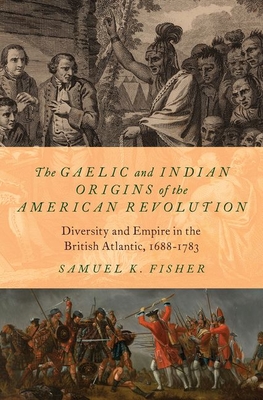The Gaelic and Indian Origins of the American Revolution: Diversity and Empire in the British Atlantic, 1688-1783

The Gaelic and Indian Origins of the American Revolution: Diversity and Empire in the British Atlantic, 1688-1783
How did an unlikely group of peoples--Irish-speaking Catholics, Scottish Highlanders, and American Indians--play an even unlikelier role in the origins of the American Revolution? Drawing on little-used sources in Irish and Scottish Gaelic, The Gaelic and Indian Origins of the American Revolution places these typically marginalized peoples in Ireland, Scotland, and North America at the center of a larger drama of imperial reform and revolution. Gaelic and Indian peoples experiencing colonization in the eighteenth-century British empire fought back by building relationships with the king and imperial officials. In doing so, they created a more inclusive empire and triggered conflict between the imperial state and formerly privileged provincial Britons: Irish Protestants, Scottish whigs, and American colonists. The American Revolution was only one aspect of this larger conflict between inclusive empire and the exclusionary patriots within the British empire. In fact, Britons had argued about these questions since the Glorious Revolution of 1688, when revolutionaries had dethroned James II as they accused him of plotting to employ savage Gaelic and Indian enemies in a tyrranical plot against liberty. This was the same argument the American revolutionaries--and their sympathizers in England, Scotland, and Ireland--used against George III. Ironically, however, it was Gaelic and Indian peoples, not kings, who had pushed the empire in inclusive directions. In doing so they pushed the American patriots towards revolution. This novel account argues that Americans' racial dilemmas were not new nor distinctively American but instead the awkward legacies of a more complex imperial history. By showcasing how Gaelic and Indian peoples challenged the British empire--and in the process convinced American colonists to leave it--Samuel K. Fisher offers a new way of understanding the American Revolution and its relevance for our own times.
PRP: 367.11 Lei
Acesta este Prețul Recomandat de Producător. Prețul de vânzare al produsului este afișat mai jos.
293.69Lei
293.69Lei
367.11 LeiLivrare in 2-4 saptamani
Descrierea produsului
How did an unlikely group of peoples--Irish-speaking Catholics, Scottish Highlanders, and American Indians--play an even unlikelier role in the origins of the American Revolution? Drawing on little-used sources in Irish and Scottish Gaelic, The Gaelic and Indian Origins of the American Revolution places these typically marginalized peoples in Ireland, Scotland, and North America at the center of a larger drama of imperial reform and revolution. Gaelic and Indian peoples experiencing colonization in the eighteenth-century British empire fought back by building relationships with the king and imperial officials. In doing so, they created a more inclusive empire and triggered conflict between the imperial state and formerly privileged provincial Britons: Irish Protestants, Scottish whigs, and American colonists. The American Revolution was only one aspect of this larger conflict between inclusive empire and the exclusionary patriots within the British empire. In fact, Britons had argued about these questions since the Glorious Revolution of 1688, when revolutionaries had dethroned James II as they accused him of plotting to employ savage Gaelic and Indian enemies in a tyrranical plot against liberty. This was the same argument the American revolutionaries--and their sympathizers in England, Scotland, and Ireland--used against George III. Ironically, however, it was Gaelic and Indian peoples, not kings, who had pushed the empire in inclusive directions. In doing so they pushed the American patriots towards revolution. This novel account argues that Americans' racial dilemmas were not new nor distinctively American but instead the awkward legacies of a more complex imperial history. By showcasing how Gaelic and Indian peoples challenged the British empire--and in the process convinced American colonists to leave it--Samuel K. Fisher offers a new way of understanding the American Revolution and its relevance for our own times.
Detaliile produsului










